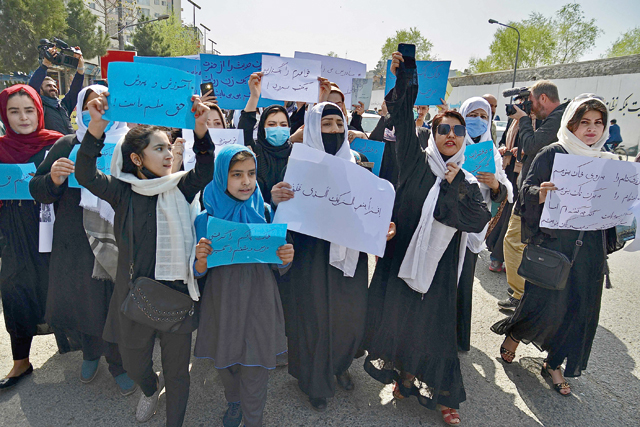KABUL — About two dozen girls and women chanting “open the schools” protested in the Afghan capital on Saturday against the Taliban’s decision to shut their secondary schools just hours after reopening them this week.
Thousands of jubilant girls across Afghanistan had flocked to learning institutions on Wednesday — the date the education ministry had set for classes to resume.
But just hours into the first day, the ministry announced a shock policy reversal that left youngsters saying they felt betrayed and foreign governments expressing outrage.
“Open the schools! Justice, justice!” chanted protesters Saturday, some carrying school books as they gathered at a city square in Kabul.
They held banners that said: “Education is our fundamental right, not a political plan” as they marched for a short distance and later dispersed as Taliban fighters arrived at the scene.
The protest was the first held by women in weeks after the Taliban rounded up the ringleaders of initial demonstrations held after they returned to power in August.
The Islamists have not given a clear reason for their decision, which came after a meeting late Tuesday of senior officials in the southern city of Kandahar, the Taliban’s de facto power centre and spiritual heartland.
It followed months of work by some foreign countries on a plan to support the payment of teachers’ wages.
Afghan secondary school girls have now been out of education for more than seven months.
“The Taliban can not oppress the women of Afghanistan,” said another protester, Laila Basim.
Since returning to power on August 15 the Taliban have rolled back two decades of gains made by the country’s women, who have been squeezed out of many government jobs, barred from travelling alone, and ordered to dress according to a strict interpretation of the Koran.
The Taliban had promised a softer version of the harsh Islamist rule that characterised their first stint in power from 1996 to 2001.
But many restrictions have still been imposed — if not at the national level then implemented locally at the whim of regional officials.
Some Afghan women initially pushed back against the Taliban’s curbs, holding small protests where they demanded the right to education and work.
But the Taliban soon rounded up the ringleaders, holding them incommunicado while denying that they had been detained.
Since their release, most have gone silent.
